In Praise of Shopping
Why the petty bourgeois is the new man of this revolution
by
Michael Walzer
July 17, 2020
Every revolutionary and national liberation movement claims to produce a new man, a new woman. The citizen embodied the newness of the French Revolution. The new Soviet man was a worker—and soon a Stakhanovite, outdoing all the other workers. Franz Fanon’s new Algerian was a fighter, then a terrorist. After centuries of landlessness, the new Jew was a pioneer and a farmer—as in the comically rhymed couplet:
Who says that Jews cannot be farmers?
Spit on those who would so harm us.
I remember a Zionist poster from pre-state days: two figures, a young man and a young woman, side by side, handsome faces, sturdy, muscular bodies, a little squarish; he is holding a shovel, she a hoe; they are looking across beautifully planted fields into the future.
There has never been a revolutionary movement whose new man was a shopkeeper. Even the bourgeois revolution flew under different colors. How can this be, given the crucial role of shopkeepers in urban life?
One of my grandfathers was set up on a farm in Connecticut by the Baron de Hirsch Foundation. De Hirsch was devoted to returning Jews to the land, not so much in Eretz Yisrael as across the diaspora—in Argentina, for example, and in Connecticut and New Jersey. My grandfather lived and died on the farm, but the next generation not. His sons moved to New York and ran grocery stores, I think, in the Bronx. His daughter, my mother, married a guy in the fur business, who later managed a jewelry store. I am a child of the petty bourgeoisie, together with a good many of the left intellectuals and activists I have worked with over the years—all of us celebrating this new man or that new woman and neglecting our ancestors.
In the old days, some Marxist writers argued that the class base of European fascism consisted of the lumpen proletariat and the petty bourgeoisie. Maybe so, though fascism could never have triumphed without support from the haute bourgeoisie—and, in Germany, without the Communist Party’s war against the social democrats and its delusional belief that nach Hitler, uns. The class history of the petty bourgeoisie is more complicated than Marxism allows. There were, as expected, shopkeepers and artisans among the members of the Jacobin clubs in the French Revolution and among the revolutionaries of 1848. But these same people were on both sides of the Democrat/Federalist divide in the early days of the American republic and they were for and against Jacksonian democracy. I am pretty sure there were shopkeepers among the Spanish anarchists in the 1930s—and also among the Jewish anarchists of New York City. The shopkeepers I knew growing up, my parents’ friends, were New Deal Democrats. (Actually, among the Jewish store owners and managers in the Pennsylvania town where we lived, I did know one Republican and one Communist.)
The communist regimes of Eastern Europe pretty much abolished the petty bourgeoisie, taking it to be the class enemy. In the cities, the small shops mostly disappeared, replaced by big state stores with standardized products and frequent shortages. Entrepreneurs operated only in the darkness of the black market. City centers were gray; the streets lost much of their liveliness.
“Late” capitalism, as it is optimistically called by some leftists, may produce a similar result, as huge corporations operating on the internet play the part of the state stores of Eastern Europe, though with a much greater diversity of goods and, until the pandemic, no shortages. More and more people shop online—as many as 20% of shoppers before COVID-19 and a much higher percentage during the lockdown, when shops were closed and streets empty. Perhaps we will get used to being delivered from want and need every day by deliverymen. (May they soon have a union to deliver them from low wages and company speed-ups.)
The petty bourgeoisie is in trouble these days, and Congress’ commendable effort to get money to struggling small businesses has, given the government we have, sent more money to big business and big banks and not enough to the shopkeepers whose praises I am singing. Many of us will, of course, return to the streets, the shops, the restaurants, and the bars. But will there be enough of us to sustain the petty bourgeois economy—to sustain anything like the old urban life?
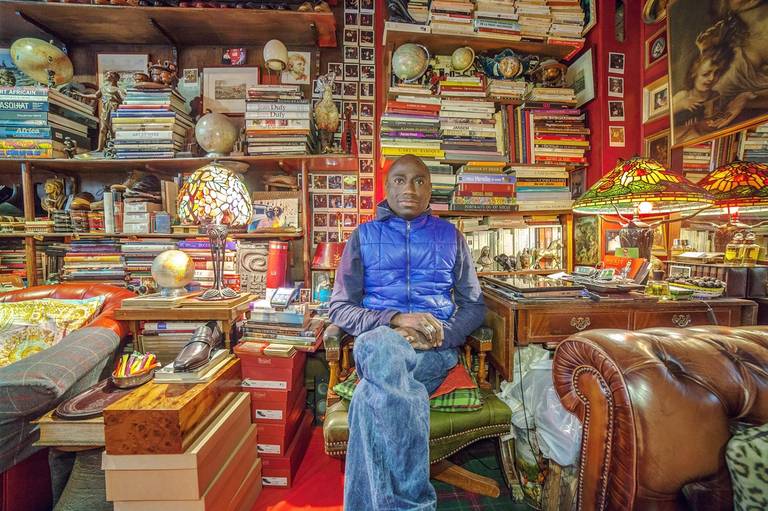

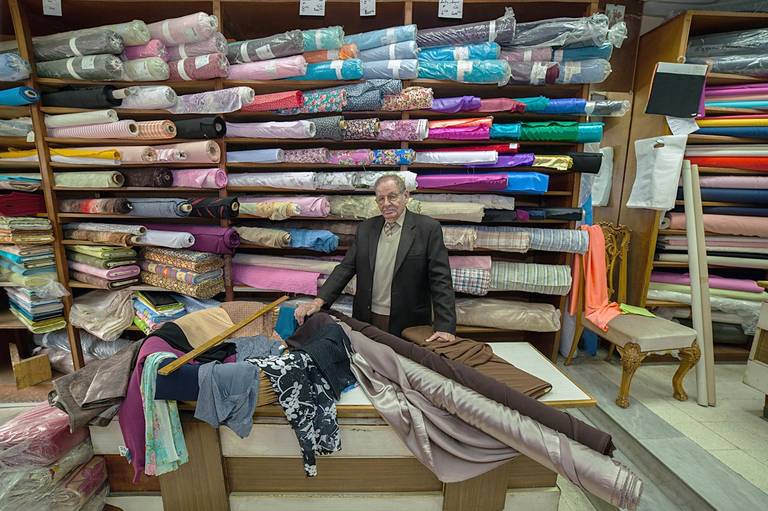
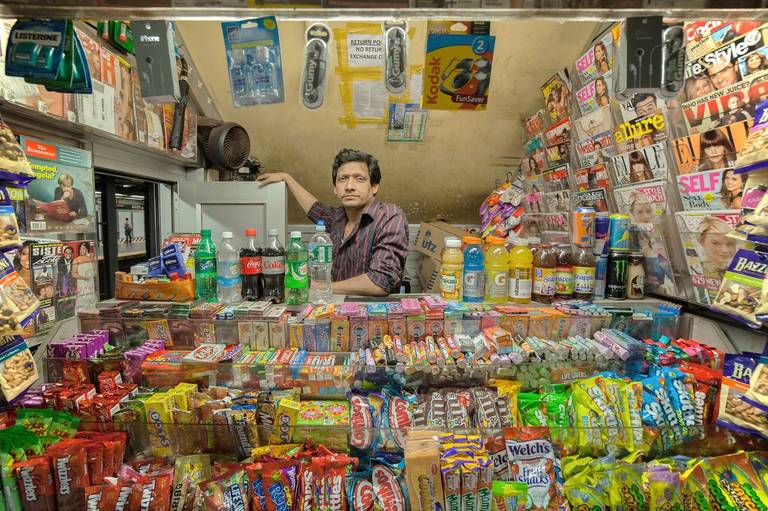
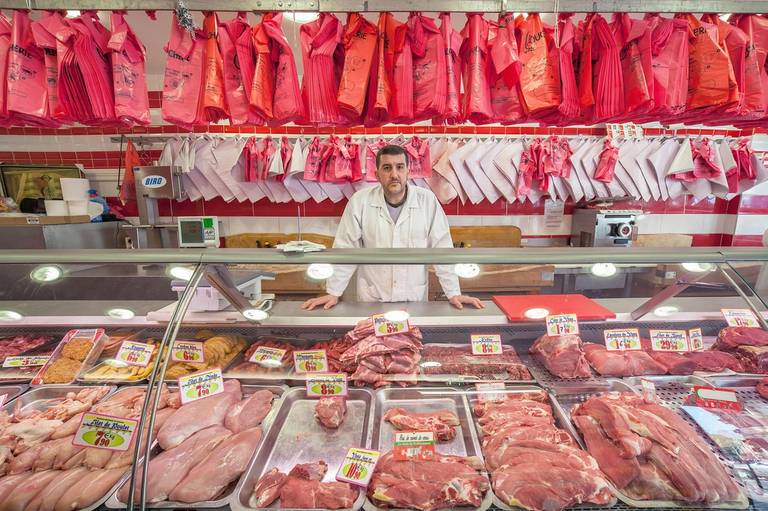
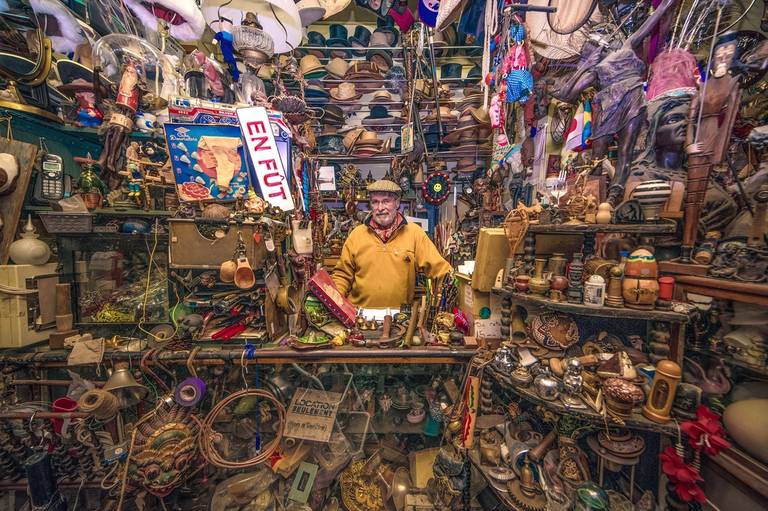
Baba, ParisVladimir Antaki, from ‘The Guardians’
So let me defend the old ways. Here is a day in the life of a shopping man. The street is not quite like it was when I was younger. Some of the little shops are gone, replaced by chain stores. But the chains are locally managed, the salespeople are also local, friendly and underpaid, and entrepreneurs come and go on the street. I walk around in what is still the world of the petty bourgeoisie, looking at the window displays—and I am drawn into a shop selling bags. I love shoulder bags; my old one isn’t old enough, but I hope in the near future to need another. The salesman shows me one that looks promising, with all the compartments and zippered pockets that I need. Soon I will have it. I stop in a café for a cup of coffee; the barista smiles at me; I’ve been here before. Then I walk to my favorite bookstore (the owner knows my name). I browse among the new politics books, read the first 20 pages of a novel, nod to a colleague who has attacked me in print. Another café and another cup of coffee; two friends are sitting, drinking; I join them and we are quickly launched on a political discussion.
Unscheduled meetings in a coffee shop or on the street: These are crucial urban experiences. Franz Kafka celebrated the café because it provided “a possibility for people to get together without being … invited, just to see others, to talk to them, observe them, without getting involved in any close relationships.” But there is always the other possibility: getting closely involved.
After my second coffee, the politics still unsettled, I am tempted by a display of men’s shirts. I have a lot of shirts, but many with frayed collars and faded colors—an excuse to buy another, which I do. Next door is a shop selling kitchenware, with lots of new gadgets; I handle them all, one by one. Now it’s time for lunch, and there is a new small restaurant featuring hummus and falafel. There aren’t enough Jews and Arabs in town to support the place, but the owner, who is also the cook, is a risk-taker; he hopes that sheer deliciousness will earn him a living. And I hope that he will be around for many lunches. (I also do, or did before the pandemic, some of the grocery shopping, but that is another story, for another time.)
Seriously, now, who would not enjoy a day like that? And there won’t be days like that without the petty bourgeoisie. No shops without shopkeepers.
I have leftist friends who think that shopping is an activity to be avoided, especially after President George W. Bush, in the days following the Sept. 11 attacks, urged all Americans to go shopping. But I don’t shop at any president’s urging; I am an autonomous shopper. “Consumerism,” critics say, is a capitalist vice. Yes, but also, like other vices, a capitalist pleasure. I promise that if social democrats like me ever come to power, it will still be an available pleasure. The promise is authoritative: Karl Marx’s son-in-law, Paul Lafargue, in a lovely essay titled “The Right To Be Lazy,” wrote that under socialism the working class “will develop indefinitely its consuming capacities.” And who but the petty bourgeoisie can serve those capacities?
Years ago, in the course of an argument about consumerism, I invented an archaeological fantasy. Around the world, archaeologists digging up ancient remains regularly find jewelry: elaborate necklaces and bracelets, ornamented combs, shiny metal mirrors. These were the possessions, we are told, of aristocratic ladies, made by skilled craftsmen, not for the lower orders. But imagine an entrepreneur in, let’s say, Babylonia, who figures out a way to make cheap imitations of the jewelry of the aristocrats. He opens a shop, and soon there are other shops. The necklaces and bracelets they sell are a little showy, perhaps, vulgar versions of what the ladies wear. But the wives and daughters of peasants, artisans, servants, even slaves flock to the stores, eager to be consumers, trying on jewelry in one shop after another. The street of shops is crowded and noisy. An austere Babylonian aristocrat comes to take a look—and thinks: “This is the end of civilization.”
No, no, I say, it’s only the beginning. The shopkeepers are the new men; they will change everything.
The images of shopkeepers in this piece are from photographer Vladimir Antaki’s book, The Guardians, available here.


No comments:
Post a Comment